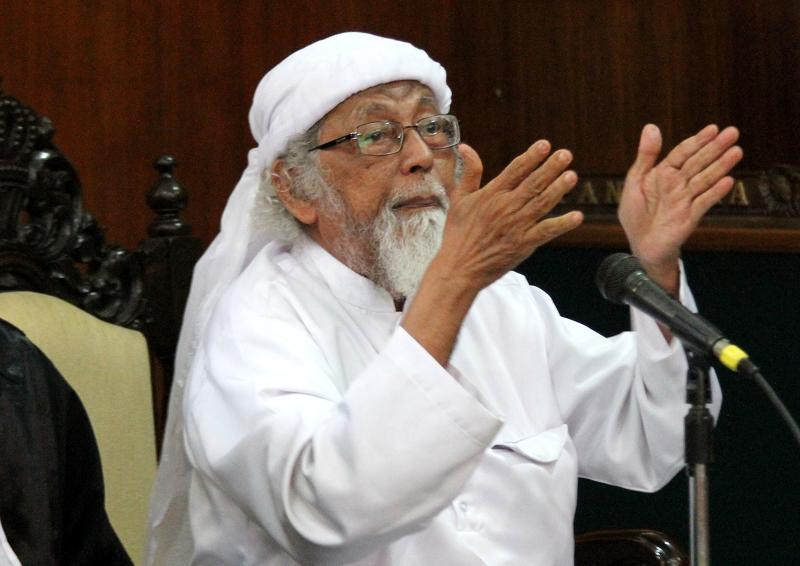Indonesia president orders review of planned release of radical cleric Abu Bakar Bashir
Sign up now: Get insights on Asia's fast-moving developments

Indonesian cleric Abu Bakar Bashir at a court appearance in Cilacap, Central Java, on Feb 9, 2016.
PHOTO: AFP
Follow topic:
JAKARTA - President Joko Widodo has ordered a more in-depth evaluation of the planned release of radical cleric Abu Bakar Bashir, Indonesia's Coordinating Political Legal and Security Minister Wiranto said on Monday (Jan 21).
The announcement, made at a hastily-called press conference, followed Mr Joko's statement on Friday that the government will this week release the firebrand cleric and spiritual leader of South-east Asia terrorist group, Jemaah Islamiah, on humanitarian grounds because of his deteriorating health. The decision has drawn strong criticism both domestically and internationally.
Bashir, 80, was the mastermind behind the 2002 Bali bombings, which killed 202 people.
Mr Wiranto told reporters that the president has asked him to review all aspects of the planned release.
Bashir's family has requested his early release since 2017 because of his poor health.
"President has instructed related officials to immediately conduct a more thorough and comprehensive assessment of the request," said Mr Wiranto.
The announcement has now cast doubt over Bashir's release.
Australian Prime Minister Scott Morrison said Saturday he had been in contact with the Indonesian government over the issue. Australia lost 88 people in the Bali bombings. "Australia's position on this matter has not changed. We've always expressed the deepest of reservations," he told Reuters.
Families of bombing victims also expressed their disappointment that Bashir might be freed.
Mr Muhammad Mahendradatta, one of Bashir's lawyers, underlined that his client was eligible for parole, having served two thirds of his sentence by Dec 13 last year.
Bashir has been in jail since his arrest in 2009 although he was only sentenced in 2011 for his support of a terrorist training camp in Indonesia's westernmost province of Aceh.
Under prevailing laws, a convict is eligible for a conditional release after serving two thirds of his prison sentence. But Bashir has not been freed, as he has refused to fulfil certain requirements, including signing papers to declare his loyalty to the Indonesian state and the founding principles of Pancasila.
Regional terrorism expert Sidney Jones described the legal grounds of Mr Joko's decision as "murky".
"It is clearly not a pardon, because Bashir never requested a pardon," she wrote in her analysis published by Australian think-tank Lowy Institute.
"It is not an amnesty. It would seem to violate Regulation 99 of 2012 from the Ministry of Law and Human Rights, which makes early release for certain categories of offenders, including convicted terrorists, contingent on their willingness to sign a written loyalty oath to the Indonesian government," wrote Ms Jones, who is also the director of Jakarta-based Institute for Policy Analysis of Conflict.
Speculations have emerged over the political motive behind the plan to release Bashir.
Mr Joko, who is seeking re-election on April 17 , has attempted to boost his Muslim credentials, including picking as his running mate conservative cleric Ma'ruf Amin, formerly the chairman of the Indonesia Ulema Council and former supreme leader of Indonesia's biggest Islamic organisation Nahdlatul Ulama.
The former Jakarta governor has been plagued by accusations, mostly circulating on social media, that he is anti-Islam and a communist.

